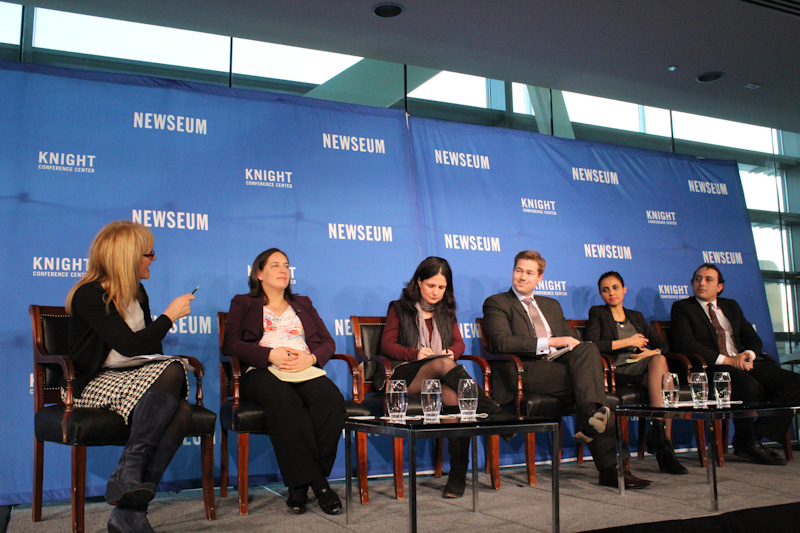Journalists and media experts discussed the red lines they face covering religion and religious freedom in China, Pakistan, Saudi Arabia, Russia, Denmark and further afield during Journalism Between Red Lines: Covering Religion and Religious Freedom in a World of Conflict, an RNS/Newseum event at the Knight Conference Center in Washington, D.C., on April 9.
https://www.youtube.com/watch?v=aKH4TiyJ0Sc#t=1922
I kicked things off with two questions: “What do legal, social, political and in many cases economic constraints mean for how religion is covered around the world? And how are reporters writing, broadcasting and blogging between these red lines?”
Dr. Katrina Lantos Swett, vice chair of the U.S. Commission on International Religious Freedom, moderated the night’s discussion.
“What religion reporters face today are two key facts,” she said. “On the one hand, for billions of people, religion matters. Yet for many of these same people, governments or societies significantly restrict religious practice.”
She added that for many journalists around the world, covering religion is not tiptoeing through the tulips. It’s tiptoeing through the land mines.
Sarah Cook, senior research analyst and China media expert at Freedom House, explained how government forces monitor and control religion and media in the country, both online and off, making the already challenging job of reporting on religion that much more difficult.
Geraldine Fagan, journalist and author of “Believing in Russia — Religious Policy after Communism,” said that Russia’s relationship with religion is also a matter of political control. There’s a strong division between the country’s “tolerated religions” and those seen as pariahs because they oppose the local and political elite. She explained President Vladmir Putin’s “unholy alliance” with the Orthodox Church and how the Pussy Riot scandal opened a Pandora’s box of contradictions in Russian society.
Johannes Langkilde, the U.S. correspondent for Danish Broadcasting Corporation, was reporting from Denmark during the 2006 Muhammad cartoons controversy. He said that the crisis was a wake-up call for the world and for local journalists, who until then often portrayed Islam and extremism as one and the same.
“If something good came out of the cartoons crisis, it is that now we have begun to report in an educated way about religion, faith and belief whereas before it was a dangerous subject, which we saw as a threat rather than a natural part of people’s lives,” he said.
Ebtihal Mubarak, a Saudi journalist who covers women and youth rights, said that all reporting in Saudi Arabia revolves around religion due to the country’s conservative religious nature but that directly reporting on or questioning religion in the media is a solid red line few journalists dare to cross.
Mubarak admitted to censoring her views while reporting on the case of a Saudi rape victim who was Shia, a religious minority in the country. She now lives in the U.S. and spoke frankly about the restrictions she faced reporting from within the kingdom.
Pir Zubair Shah, a Pulitzer Prize-winning Pakistani journalist, described his country as one of the most dangerous for journalists and said that most reporters lack the basic training necessary to cover sensitive issues like religion with accuracy and independence.
“You can’t just discuss religion, let alone make jokes,” he said, citing security concerns, economic concerns and a society deeply divided along sectarian lines. “Blasphemy laws can put you behind bars and result in conviction and execution,” he added.
Watch the full video above for more highlights and a spirited Q&A following this fascinating discussion.





